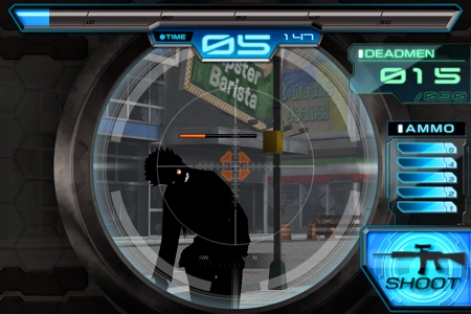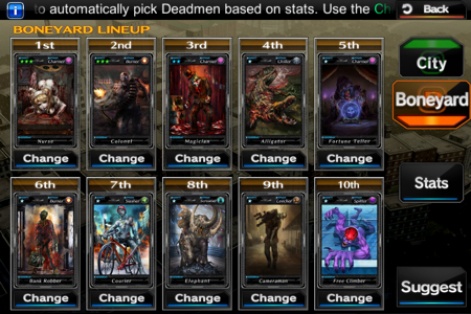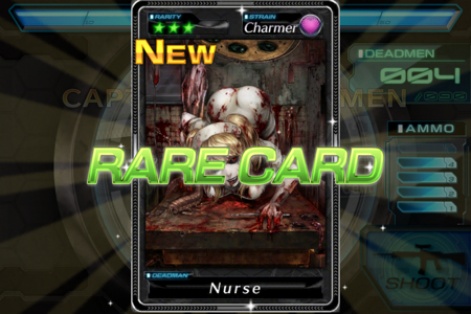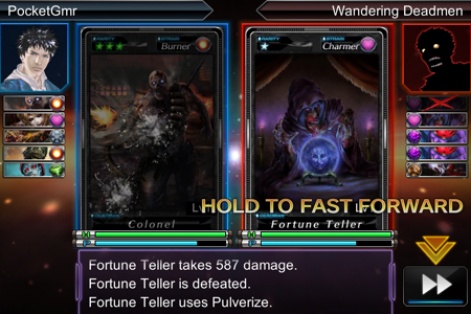Welcome to The In-App Purchase Inspector - our regular look at free-to-play games from the consumer's perspective.
Each instalment, we'll be looking at the incentives or pressure applied to make in-app purchases, their perceived value, the expansion offered by the IAPs and the overall value of the experience.
The end goal will be to see whether the game makes a good enough case for us to part with our cash, or whether players are content - or engaged enough - to 'freeload'.
This week, we take a look at Square Enix's free-to-play card battler, Deadman's Cross.
First impressions
Deadman's Cross is easily the stealthiest collectable card game (CCG) on the App Store at the moment.
It cloaks the usual CCG tropes in a dark and gritty post-apocalyptic RPG world, and Square Enix has really played up its hybrid first-person shooter gameplay. All of this looks and works a treat, and so it's easy to forget you're playing a card battler.
After all, there are no packs of cards to open.

Instead, you go on 'hunts' to shoot zombies - here, Deadmen - and those that you bring down are added to your deck as cards.
Once a deck is built, you can evolve/combine cards, enhance them with stat-boosting drops, and rearrange them into custom-tailored decks.
In short, it's a CCG hidden in a FPS zombie game with some light RPG quest elements tossed in for good measure - and it's amazing how well it all works given its byzantine steup.
Opening virtual card packs never set my pulse racing the way opening a physical booster pack of Magic: The Gathering cards did, but there's an undeniable air of excitement in the interactive way that Deadman's Cross handles its packs.
Unfortunately, the card battling itself seems like something of an afterthought - as there's really not much strategy to dig into.
Pressure to purchase
Curiously, Deadman's Cross has only one currency - Deadman's Coins.
You can use these to go on 'Elite Course' hunts, which are the equivalent of rare card packs - in so much that you can shoot them - and feature only Rare, Epic, or Legendary Deadmen for players to collect.
What's interesting about this course-based approach, however, is that you are in no way guaranteed a certain number of cards per run.
Each run - even the paid ones - is limited to 60 seconds in length and it's possible to walk away empty handed if you completely pooch a run. Granted this is hard to more, but more likely is that you won't shoot any new cards, which is almost as bad.

Obviously, you don't want to go on Elite Course hunts unless you can fully devote your attention to Deadman's Cross - but they are the most dependable way to get high-value cards.
You can also use Deadman's Coins to buy energy drinks and refill your stamina, which depletes as you take on jobs and explore buildings, but this refills quickly enough on its own.
There's really no pressure to spend the currency when you can just set your phone down for 15 minutes so you can move into the next room.
Perceived value of in-app purchases
The real draw to spend on currency, then, lies in the valuable cards you can bag from Elite Courses.

As is the case with many CCGs, these Rare/Epic/Legendary cards are generally leagues above the standard cards you'll have several duplicates of, and a lucky find can quickly render an upgraded card that you've worked on for weeks obsolete.
This is all part of the draw of CCGs, and I have to admit that the quality, versatility, and artwork of the rare cards found on the one Elite Course run I paid for would tempt me into considering another run in the future.
Unfortunately, the price of runs is a bit steep for a chance of getting 4-7 cards. Knowing that I could walk away with only 2-3 makes the $2.99/£1.99 asking price a bit hard to swallow.
The experience
Happily, you can absolutely enjoy Deadman's Cross without spending a dime.
You're given one Standard Course hunting permit per day and can earn others through jobs (dungeon instances) - so it's entirely possible to eke out a fun game experience without sending hard currency in Square Enix's direction.
The only real problem with the experience, however, is the card battling itself.
Battles play out with the two cards sitting side by side as a flurry of supposed attacks and defenses scrolls by at the bottom. You can't do anything as the cards fight, but you can fast-forward your way through the battle - and Deadman's Cross never hesitates to remind you of that fact.
Overall Value
Despite the CCG genre obfuscation, it becomes quite clear after a few minutes of play that Deadman's Cross is a card battler through-and-through and its 'coins' are really rare card packs in disguise.
There's precious little that you can spend them on other than Elite Course runs, so once you square yourself with that fact their cost and presence becomes a bit easier to accept.
Or, rather, it would be easy if there wasn't the nagging element of randomness mentioned earlier. If you're off your game on an Elite Course run, you'll essentially spend $3.00 to pick up 2-3 rare cards.

Maybe these cards will galvanize your deck into an opponent-shredding death machine, but you really have no way of knowing that and - worse - there's no Mulligan option for exceptionally poor runs.
Conclusion
Despite the randomness introduced in the element of pack size, it's still easy to get invested in Deadman's Cross and easier still to eventually warm up to the idea of splurging on an Elite Course run every now and then.
Sure, it's a CCG hidden in a post-apocalyptic FPS skin - and it's a bit off-putting that Elite Course runs are so unpredictable, but it's hard not to enjoy an off-the-wall card battler that lets you recruit undead elephants and feed them to a fetishistic zombie nurse card you picked up when you gunned said nurse down with a high-powered sniper rifle.
Walking away from my time with Deadman's Cross, I've concluded that it - and its IAPs - are best enjoyed in moderation.






















